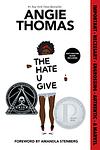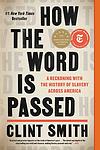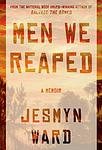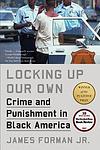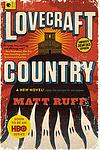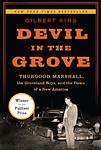The Greatest "Racism" Books of All Time
Click to learn how this list is calculated.
This list represents a comprehensive and trusted collection of the greatest books. Developed through a specialized algorithm, it brings together 300 'best of' book lists to form a definitive guide to the world's most acclaimed books. For those interested in how these books are chosen, additional details can be found on the rankings page.
Genres
The category of "Racism" in books refers to literature that explores the complex and often painful experiences of individuals and communities who have been subjected to discrimination, prejudice, and bigotry based on their race or ethnicity. These books may examine the historical roots of racism, its impact on society, and the ways in which individuals and communities have resisted and overcome it. They may also offer insights into the psychological and emotional toll of racism, as well as the ways in which it intersects with other forms of oppression such as sexism, homophobia, and classism. Overall, books in this category seek to raise awareness of the ongoing struggle against racism and to promote greater understanding and empathy among readers.
Countries
Date Range
Reading Statistics
Click the button below to see how many of these books you've read!
Download
If you're interested in downloading this list as a CSV file for use in a spreadsheet application, you can easily do so by clicking the button below. Please note that to ensure a manageable file size and faster download, the CSV will include details for only the first 500 books.
Download-
26. Common Ground by J. Anthony Lukas
"Common Ground" is a non-fiction book that provides an in-depth examination of racial tensions in Boston, Massachusetts during the 1960s and 1970s, primarily focusing on the controversial issue of court-ordered busing to integrate public schools. The narrative follows three families - one African-American, one Irish-American, and one Yankee - to depict the effects of these tensions on the city's different communities. The book also explores the historical, political, and social context of these events, offering a comprehensive analysis of a critical period in American history.
-
27. Praying for Sheetrock by Melissa Fay Greene
"Praying for Sheetrock" is a non-fiction narrative that tells the story of racial tension and civil rights struggles in a small coastal town in Georgia during the 1970s. It focuses on the experiences of the African American community who, led by a charismatic shrimp boat worker, stand up against the corruption and racial discrimination perpetrated by the town's white sheriff and his deputies. The book provides an intimate portrayal of the town's residents, their hardships, and their fight for justice and equality.
-
28. War Without Mercy by John W. Dower
This book provides a detailed analysis of the racial aspects that influenced the Pacific War during World War II. It explores the racial stereotypes, propaganda, and policies that were used by both the United States and Japan, and how these factors contributed to the extreme violence and hatred that characterized the conflict. The book also examines the impact of these racial attitudes on the post-war relations between the two countries.
-
29. The Reluctant Fundamentalist by Mohsin Hamid
The novel is a monologue by a young Pakistani man, Changez, who tells his life story to an American stranger in a café in Lahore. Changez recounts his journey from a scholarship student at Princeton to a high-flying job in a prestigious New York valuation firm and his subsequent disillusionment with the American Dream post 9/11. The story explores themes of identity, love, and the shifting global power dynamics, as Changez grapples with his feelings towards America, his native Pakistan, and his love interest, Erica. The narrative ends ambiguously, leaving the reader to interpret the true nature of Changez and his American listener's relationship.
-
30. Dear Theo: The Autobiography of Vincent Van Gogh by Irving Stone, Jean Stone
The book is a compilation of letters from the renowned Dutch painter to his brother Theo, offering an intimate glimpse into the artist's life, thoughts, and struggles. Through these personal correspondences, readers gain insight into the painter's evolving artistic vision, his financial hardships, and his battle with mental illness. The letters also reveal the deep bond between the brothers, with Theo providing unwavering emotional and financial support. This collection not only sheds light on the painter's complex inner world but also provides a unique perspective on his journey to becoming one of the most influential figures in the history of Western art.
-
31. Race Matters by Cornel West
This book is a profound exploration of the impact of race and racism on modern America. It examines the crisis of African-American leadership, the pitfalls of black conservatism, the myth of 'gangsta' culture, and the temptations of black nationalism. The author also delves into the complexities of affirmative action and the damaging effects of the nihilistic threat to the black community. The work offers a critical analysis of the current state of race relations in the United States and proposes solutions for creating a more equitable society.
-
32. The Hate U Give by Angie Thomas
The novel follows the story of a teenage girl who witnesses the fatal shooting of her childhood best friend at the hands of a police officer. Living in a poor neighborhood but attending a predominantly white, wealthy private school, she must navigate the dichotomy of these two very different worlds while grappling with the trauma of her friend's death. As she becomes more involved in activism and advocacy, she must confront the reality of racism, police brutality, and societal injustice.
-
33. Arab and Jew by David K. Shipler
The book explores the cultural, political, and personal divisions between Arabs and Jews in the Middle East, specifically in Israel and Palestine. The author, through extensive interviews and personal experiences, delves into the deeply rooted prejudices, stereotypes, and mutual misunderstandings that fuel the ongoing conflict. The book sheds light on the human aspect of the struggle, highlighting the shared similarities and the tragic consequences of the divide.
-
34. The Protocols of the Elders of Zion by Unknown
"The Protocols of the Elders of Zion" is a controversial and widely debunked text that purports to describe a global conspiracy by Jews to control the world. This fabricated text, first published in Russia in the early 20th century, has been used throughout history to fuel anti-Semitism and justify persecution of Jews. Despite being exposed as a hoax, the document continues to be cited by some conspiracy theorists and hate groups. It is important to note that the text is widely recognized as a harmful and false piece of propaganda.
-
35. How The Word Is Passed: A Reckoning With The History Of Slavery Across America by Clint Smith
"How The Word Is Passed" is a powerful and thought-provoking exploration of the legacy of slavery in America. Through a series of vivid and evocative essays, author Clint Smith takes readers on a journey across the United States, visiting sites that are deeply connected to the history of slavery and its aftermath. From Monticello to Angola Prison, Smith offers a nuanced and insightful look at the ways in which slavery has shaped our country and continues to impact our lives today. With a clear-eyed and compassionate approach, "How The Word Is Passed" is a must-read for anyone interested in understanding the complex and ongoing legacy of slavery in America.
-
36. Men We Reaped by Jesmyn Ward
This memoir is a poignant exploration of the author's life growing up in a poor, rural, predominantly black community in the Southern United States, and the tragic deaths of five young men close to her, including her brother. Through her personal experiences, the author provides a powerful critique of systemic and institutional racism, poverty, and the lack of opportunities for black men in America. The narrative weaves together these stories of loss, revealing the devastating impact of societal inequities on marginalized communities.
-
37. Locking Up Our Own: Crime and Punishment in Black America by James Forman
This book delves into the complex and controversial issue of mass incarceration in the United States, particularly within the African American community. It explores the historical, social, and political factors that contributed to the high rates of black imprisonment. The author examines the role of African American leaders in advocating for tough-on-crime policies and their unintended consequences. The book is a thought-provoking analysis of the intersection of race, crime, and justice in America.
-
38. Slavery by Another Name by Douglas A. Blackmon
The book explores the concept of "neoslavery," which entrapped thousands of African Americans in the South in a system of forced labor after the Civil War. This system was perpetuated by local laws, racial prejudice, and economic manipulation, where black men were arrested on false charges, then sold to companies as cheap labor. The book illuminates the forgotten history of this "age of neoslavery" that persisted into the 20th century and its profound impact on the racial disparities that exist today.
-
39. Journey Without Maps by Graham Greene
This travelogue details the author's trek through the interior of Liberia, a journey undertaken in the 1930s. The narrative provides a vivid account of the people, culture, and harsh realities of life in the African interior, as well as the author's own introspections and experiences. The journey is both a physical exploration of a little-known part of the world and a philosophical exploration of the author's own beliefs and values.
-
40. Sons of Mississippi by Paul Hendrickson
"Sons of Mississippi" is a powerful exploration of the legacy of racism in the American South. The book uses a famous photograph of seven Mississippi sheriffs preparing to thwart James Meredith's integration of the University of Mississippi in 1962 as a starting point. The author then traces the lives and descendants of these men, providing a deep and nuanced look at the enduring effects of prejudice and discrimination, as well as the struggle for civil rights and racial equality in the United States.
-
41. Rough Crossings by Simon Schama
"Rough Crossings" is a historical account of the experience of African American slaves during the American Revolution. It focuses on the British promise to grant freedom to slaves who joined their cause, and the subsequent journey of these former slaves to Nova Scotia and Sierra Leone. The book explores the complexities of this period in history, questioning the traditional narrative of the American Revolution and shedding light on the struggle for freedom and equality by African Americans.
-
42. Lovecraft Country by Matt Ruff
"Lovecraft Country" is a captivating and thought-provoking novel that seamlessly blends elements of horror, science fiction, and historical fiction. Set in the 1950s, the story follows a young African American man named Atticus Turner as he embarks on a dangerous journey through the racially segregated United States. Along the way, Atticus and his friends encounter supernatural forces, face institutional racism, and confront the horrors of Lovecraftian mythology. With its richly drawn characters and exploration of racial tensions, the book offers a unique and compelling perspective on both the genre of horror and the complexities of American society.
-
43. The Problem of Slavery in the Age of Emancipation by David Brion Davis
"The Problem of Slavery in the Age of Emancipation" is a historical work that explores the complexities of slavery and the abolitionist movement during the Age of Emancipation. The book delves into the moral, political, and ideological challenges faced during this time, focusing on the struggles of enslaved Africans and African Americans. It also examines the role of colonization and the struggle to redefine "black" and "white" identities in the aftermath of slavery. The author uses a comparative approach, looking at the American, British, and French experiences of slavery and emancipation.
-
44. Island on Fire: The Revolt That Ended Slavery in the British Empire by Tom Zoellner
The book chronicles the 1831 slave rebellion in Jamaica, a significant event that hastened the abolition of slavery in the British Empire. The narrative details the planning and execution of the revolt, the brutal suppression by the colonial authorities, and the aftermath, including the public outrage in Britain that led to legislative reform. The book also explores the role of key figures in the uprising, providing a detailed account of this pivotal moment in history.
-
45. The Hemingses of Monticello by Annette Gordon-Reed
This book explores the complex and controversial history of Thomas Jefferson's relationship with his slave, Sally Hemings, and her family. It provides a detailed account of the Hemings family's life at Monticello, their interactions with Jefferson, and their experiences during and after his presidency. The narrative also delves into the wider context of slavery, race, and society in the late 18th and early 19th centuries, challenging traditional views and offering a fresh perspective on a well-known historical figure and his time.
-
46. Devil in the Grove: Thurgood Marshall, the Groveland Boys, and the Dawn of a New America by Gilbert King
The book is a gripping account of the Groveland Boys, four African American men falsely accused of raping a white woman in Florida in 1949, and the efforts of Thurgood Marshall, a future Supreme Court justice, to defend them. The narrative delves into the depths of racial injustice and violence in the Jim Crow South, and shows how Marshall's fight for the Groveland Boys helped to lay the groundwork for the Civil Rights Movement and the desegregation of America.
-
47. Stamped from the Beginning: The Definitive History of Racist Ideas in America by Ibram X. Kendi
This book offers a comprehensive history of anti-Black racist ideas in America, tracing their development from the earliest days of the country to the present. It challenges the notion that racism is merely the product of ignorance and hatred, instead arguing that it is a powerful and enduring system of thought that has been deliberately constructed and maintained over centuries. The book also explores the complex ways in which racist ideas have been used to justify and perpetuate social, economic, and political inequalities.
-
48. Neither Black Nor White by Carl N. Degler
"Neither Black Nor White" is a comprehensive historical analysis of racial relations in Brazil and the United States. The book compares and contrasts the racial policies and societal attitudes in the two countries, arguing that Brazil's more fluid concept of race and less rigid segregation policies have resulted in a significantly different racial climate compared to the United States. The author uses historical data and sociological studies to support these claims, providing an in-depth look at the complexities of race relations in both countries.
-
49. The Dred Scott Case by Don E. Fehrenbacher
This book provides an in-depth analysis of the Dred Scott case, a significant event in American history that heightened tensions between the North and South, leading up to the Civil War. The author meticulously examines the political, social, and legal contexts surrounding the case, the individuals involved, and the controversial Supreme Court decision that ruled African Americans were not citizens and could not sue in federal court. The book further explores the case's profound impact on the nation, contributing to the secession of Southern states and the onset of the Civil War.
-
50. Been in the Storm So Long by Leon F. Litwack
"Been in the Storm So Long" provides an in-depth look into the experiences of African Americans during the Civil War and Reconstruction era. The book vividly illustrates the transition from slavery to freedom, focusing on the struggles and resilience of former slaves as they sought to establish their place in a society that had long oppressed them. It delves into the emotional, economic, and political changes that took place during this period and how they affected the lives of African Americans, both individually and collectively.
Reading Statistics
Click the button below to see how many of these books you've read!
Download
If you're interested in downloading this list as a CSV file for use in a spreadsheet application, you can easily do so by clicking the button below. Please note that to ensure a manageable file size and faster download, the CSV will include details for only the first 500 books.
Download





